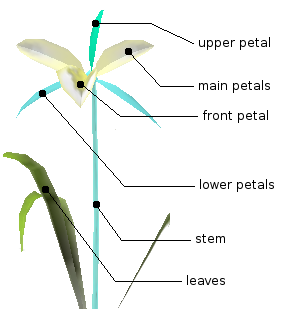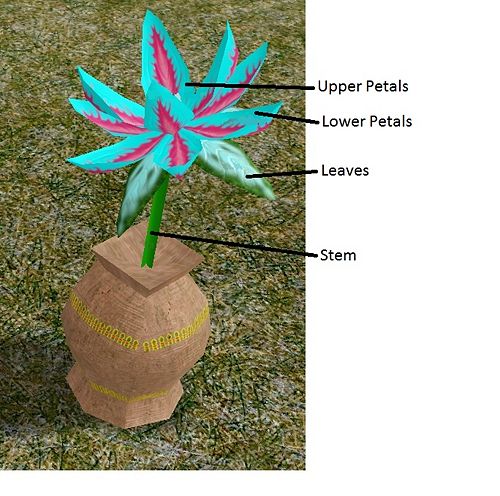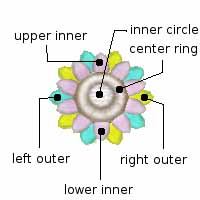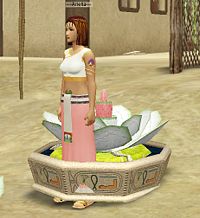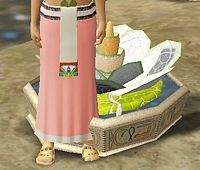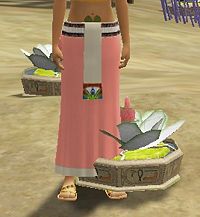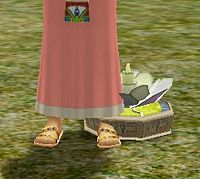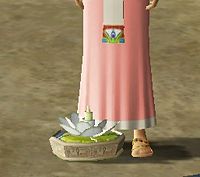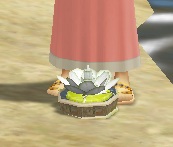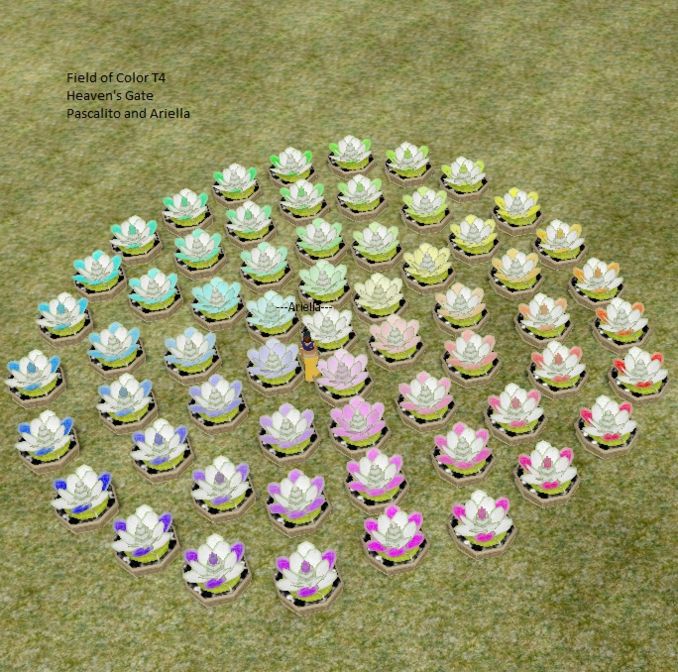The Wiki for Tale 4 is in read-only mode and is available for archival and reference purposes only. Please visit the current Tale 11 Wiki in the meantime.
If you have any issues with this Wiki, please post in #wiki-editing on Discord or contact Brad in-game.
Difference between revisions of "Flower Genome Theories"
| (49 intermediate revisions by 6 users not shown) | |||
| Line 1: | Line 1: | ||
| + | [[Category:Flowers]] | ||
| + | |||
| + | =General Color Theory in all flowers= | ||
| + | |||
| + | *Primary colors: Cyan, Magenta, Yellow | ||
| + | |||
| + | [[Image:Cyan1SeaLily.jpg | 100px | Cyan Shade 1]] | ||
| + | [[Image:Cyan2SeaLily.jpg | 100px | Cyan Shade 2]] | ||
| + | [[Image:Cyan3SeaLily.jpg | 100px | Cyan Shade 3]] | ||
| + | [[Image:Cyan4SeaLily.jpg | 100px | Cyan Shade 4]] | ||
| + | |||
| + | Cyan Shade 1............Shade 2............Shade 3............Shade 4 <br> | ||
| + | |||
| + | [[Image:Magenta1SeaLily.jpg | 100px | Magenta Shade 1]] | ||
| + | [[Image:Magenta2SeaLily.jpg | 100px | Magenta Shade 2]] | ||
| + | [[Image:Magenta3SeaLily.jpg | 100px | Magenta Shade 3]] | ||
| + | [[Image:Magenta4SeaLily.jpg | 100px | Magenta Shade 4]] | ||
| + | |||
| + | Magenta Shade 1............Shade 2............Shade 3............Shade 4 <br> | ||
| + | |||
| + | [[Image:Yellow1SeaLily.jpg | 100px | Yellow Shade 1 ]] | ||
| + | [[Image:Yellow2SeaLily.jpg | 100px | Yellow Shade 2 ]] | ||
| + | [[Image:Yellow3SeaLily.jpg | 100px | Yellow Shade 3 ]] | ||
| + | [[Image:Yellow4.jpg | 100px | Yellow Shade 4 ]] | ||
| + | |||
| + | Yellow Shade 1............Shade 2............Shade 3............Shade 4 <br> | ||
| + | |||
| + | *Secondary colors: Blue, Green, Red | ||
| + | **Red = Magenta + Yellow | ||
| + | **Green = Cyan + Yellow | ||
| + | **Blue = Cyan + Magenta | ||
| + | |||
| + | [[Image:Blue1SeaLily.jpg | 100px | Blue Shade 1]] | ||
| + | [[Image:Blue2SeaLily.jpg | 100px | Blue Shade 2]] | ||
| + | [[Image:Blue3SeaLily.jpg | 100px | Blue Shade 3]] | ||
| + | [[Image:Blue4SeaLily.jpg | 100px | Blue Shade 4]] | ||
| + | |||
| + | Blue Shade 1............Shade 2............Shade 3............Shade 4 <br> | ||
| + | |||
| + | [[Image:Green1SeaLily.jpg | 100px | Green Shade 1]] | ||
| + | [[Image:Green2SeaLily.jpg | 100px | Green Shade 2]] | ||
| + | [[Image:Green3SeaLily.jpg | 100px | Green Shade 3]] | ||
| + | [[Image:Green4SeaLily.jpg | 100px | Green Shade 4]] | ||
| + | |||
| + | Green Shade 1............Shade 2............Shade 3............Shade 4 <br> | ||
| + | |||
| + | [[Image:Red1SeaLily.jpg | 100px | Red Shade 1]] | ||
| + | [[Image:Red2SeaLily.jpg | 100px | Red Shade 2]] | ||
| + | [[Image:Red3SeaLily.jpg | 100px | Red Shade 3]] | ||
| + | [[Image:Red4SeaLily.jpg | 100px | Red Shade 4]] | ||
| + | |||
| + | Red Shade 1............Shade 2............Shade 3............Shade 4 <br . | ||
| + | |||
| + | *Other color combinations | ||
| + | **Black = Cyan + Magenta + Yellow (Grey is only a light black in color terms) | ||
| + | **Orange = Magenta + Yellow + Yellow | ||
| + | |||
| + | See [[Sea Lily Colors]] for a general color reference chart. | ||
| + | |||
| + | '''GENE NAMES ARE THE NAMES OF COLORS NOT THE COLORS THEMSELVES. AS AN EXAMPLE, DO NOT CONFUSE THE GENE NAME Orange or the abbreviated gene name O with the color orange.''' | ||
| + | |||
| + | *4 Shades of a primary color exist which produce progressively richer and denser coloring from 1 to 4. Notation is Colorx where x=1 to 4 shades. <br> | ||
| + | **Example: Mag2 = Two shades of Magenta in a sea lily = GOOO GOOO | ||
| + | |||
| + | When x is used in a notation such Uxxx, each x must equal the same gene name, like URRR or UOOO or IYY. | ||
| + | |||
| + | '''The color key codes for x can be different for each flower type! So check carefully.''' | ||
| + | |||
| + | =Orchid Genome Theory= | ||
| + | [[Image:orchid.png|frameless|700px]] | ||
| + | |||
| + | I is a separator, it does nothing but prevent overlaps of gene sets. | ||
| + | |||
| + | *Color gene sets | ||
| + | ** Ux for the stem | ||
| + | ** xU for the leaves | ||
| + | ** Rxx for main petals | ||
| + | ** Rx for upper petal | ||
| + | ** xR for front petal | ||
| + | ** xxx or URx for lower petals. | ||
| + | |||
| + | *Color key for x | ||
| + | ** x=O for cyan | ||
| + | ** x=Y for magenta | ||
| + | ** x=G for yellow | ||
| + | |||
| + | *Size gene sets | ||
| + | * ROYG for giant | ||
| + | * GYOR for dwarf | ||
| + | * Giant and Dwarf genes cancel each other out exactly so there are no half dwarves/giants. | ||
| + | |||
| + | =Rose Genome Theory= | ||
| + | |||
| + | [[Image:RoseLabel.jpg|frameless|500px]] | ||
| + | |||
| + | *Petal color gene sets | ||
| + | **Rxx = Outer Petal | ||
| + | **xxR = Inner Petal | ||
| + | |||
| + | *Petal color key | ||
| + | **O=Cyan | ||
| + | **Y=Magenta | ||
| + | **G=Yellow | ||
| + | |||
| + | *Stamen and leaves gene sets | ||
| + | **xU = Stamen | ||
| + | **Ux = Leaves | ||
| + | |||
| + | *Stamen and leaves color key | ||
| + | **R=Cyan | ||
| + | **O=Magenta | ||
| + | **Y=Yellow | ||
| + | |||
| + | |||
| + | Size is encoded as below: | ||
| + | |||
| + | ROYGU = Giant x 1 <br> | ||
| + | UGYOR = Dwarf x 1 <br> | ||
| + | I don't believe Giant is x1, a 2xDwarf + 1xGiant is not the same size as a 1xDwarf, but a bit smaller. /McArine | ||
| + | |||
| + | Number of ferts until bulb split is achieved is still a mystery as to which genes control this aspect.<br> | ||
| + | My experience with bulb splits is, that it is achieved randomly. I've had batches I know was fertilized the same number of times, and had some splitting 3 ferts before others. /McArine | ||
| + | |||
| + | =Sand Bloom Genome Theory= | ||
| + | |||
| + | [[Image:SandBloom1.jpg|frameless|700px]] | ||
| + | |||
| + | *Color gene sets | ||
| + | **xG for right outer petal | ||
| + | **Gx for left outer petal | ||
| + | **Ux for upper inner petal | ||
| + | **xU for lower inner petal | ||
| + | **Ix for the center ring | ||
| + | **xI for the inner circle | ||
| + | |||
| + | *Color key for x | ||
| + | **O = magenta | ||
| + | **Y = yellow | ||
| + | **R = cyan | ||
| + | |||
| + | |||
| + | *Size gene sets | ||
| + | **ROYG for giant | ||
| + | **GYOR for dwarf | ||
| + | **Normal size = 0 (size of Sacrifice or Sunshine) | ||
| + | **Giant gene set = ROYG = +1 (size of Calliope) | ||
| + | **Dwarf gene set = GYOR = -3 (Petit Mal is dwarfx2) | ||
| + | |||
| + | 'C' is a spacer to separate color coding as on Lemon Drop it keeps YG and YU from becoming GY and UY. <br> | ||
| + | |||
=Sea Lily Genome Theory= | =Sea Lily Genome Theory= | ||
| − | Genomes separated into | + | Genomes separated into gene sets that affect the color, size and fertilization rate of a lily. <br> |
Blush GROR V GOOO V UROO V IO V IOO V IOOO <br> | Blush GROR V GOOO V UROO V IO V IOO V IOOO <br> | ||
Clarity IRIR IOIO IYIY GORR GROR GRRO GORR GROR GRRO <br> | Clarity IRIR IOIO IYIY GORR GROR GRRO GORR GROR GRRO <br> | ||
| − | Crown UROO UROO V UR | + | Crown UROO UROO UROO V UR V OO V UR V OR V UROR UROR UROR <br> |
Delicate IO IO IO IY IY IY GYOR <br> | Delicate IO IO IO IY IY IY GYOR <br> | ||
Energy VVVVV UYYY UYYY GYYY GYYY GRRO GRRO UROR UROR VVVVV <br> | Energy VVVVV UYYY UYYY GYYY GYYY GRRO GRRO UROR UROR VVVVV <br> | ||
| Line 13: | Line 163: | ||
Vampire IY IY IO IY IO IO <br> | Vampire IY IY IO IY IO IO <br> | ||
| − | ==Lily Color | + | ==Lily Color Gene Sets== |
| − | |||
| − | |||
| − | |||
| − | |||
| − | |||
| − | |||
| − | |||
| − | |||
| − | |||
| − | |||
| − | |||
| − | |||
| + | *Stamen can be Ix(Outer Stamen) Ixx(Middle Stamen) or Ixxx(Inner Stamen) See Stamen Layering Note and color key for 'x'. | ||
| + | Note:'''Stamen Layering.''' Color shades increase on the separate stamen levels from upper(richest color) to lower(weakest shade) by combination of the gene sets. Example: <br> | ||
| + | ..........Ix <br> | ||
| + | ..........Ix x <br> | ||
| + | ..........Ix x x <br> | ||
| + | Shade 3 2 1 <br> | ||
| − | + | *Inner East Petal Set Uxxx (see color Key below) | |
| − | + | **Example: xxx=RRR=Cyan | |
| − | *Inner East Petal Set Uxxx ( | ||
*Inner West Petal Set Uxyz | *Inner West Petal Set Uxyz | ||
**UORR = Cyan | **UORR = Cyan | ||
**UROO = Magenta | **UROO = Magenta | ||
**UROR = Yellow | **UROR = Yellow | ||
| − | *Outer South Petal Set Gxxx ( | + | *Outer South Petal Set Gxxx (see color Key below) |
| + | ** Example: xxx=OOO=Magenta | ||
*Outer North Petal Set Gxyz | *Outer North Petal Set Gxyz | ||
**GORR = Cyan | **GORR = Cyan | ||
| Line 41: | Line 185: | ||
**GRRO = Yellow | **GRRO = Yellow | ||
| − | + | *Color key for x | |
| − | + | **R = Cyan | |
| − | + | **O = Magenta | |
| − | + | **Y = Yellow | |
| − | |||
Note: '''Petal sets.''' There are 6 outer petals and 6 inner petals arranged around the stamen. A petal gene set colors 3 alternating petals. For example, the Outer North Petal Set consists of the north, southeast and southwest petals being colored grey on Clarity. The Inner West Petal Set consists of the west, northeast and southeast petals being colored red on Crown. | Note: '''Petal sets.''' There are 6 outer petals and 6 inner petals arranged around the stamen. A petal gene set colors 3 alternating petals. For example, the Outer North Petal Set consists of the north, southeast and southwest petals being colored grey on Clarity. The Inner West Petal Set consists of the west, northeast and southeast petals being colored red on Crown. | ||
| − | ==Size | + | ==Size Gene Sets== |
Normal size = 0.0 (size of most original lilies) <br> | Normal size = 0.0 (size of most original lilies) <br> | ||
| Line 56: | Line 199: | ||
Semidwarf = ROYG(Giant) + GYOR(Dwarf) = +0.5 + (-)1.0 = -0.5 (size of Dusk) <br> | Semidwarf = ROYG(Giant) + GYOR(Dwarf) = +0.5 + (-)1.0 = -0.5 (size of Dusk) <br> | ||
| − | ==Fertilization Rate | + | '''Size Chart for Sea Lilies''' |
| + | (Make sure your avatar is Very Tall to do this comparison-->Click Self/Appearance/Editor/Height Tab) | ||
| + | |||
| + | [[Image:Normal_Size_Lily.jpg | 200px | Normal Size Lily]] | ||
| + | [[Image:SemiDwarf_Lily.jpg | 200px | Semi-Dwarf Size Lily]] | ||
| + | [[Image:Dwarf_Lily.jpg | 200px | Dwarf Size Lily]] | ||
| + | |||
| + | Normal.........................................Semi-Dwarf..........................................Dwarf | ||
| + | |||
| + | [[Image:Dwarf_x_2_Lily.jpg | 200px | Dwarf x 2 Size Lily]] | ||
| + | [[Image:Dwarf_x_3_Lily.jpg | 200px | Dwarf x 3 Size Lily]] | ||
| + | [[Image:Dwarf_x_4_Lily.jpg | 200px | Dwarf x 4 Size Lily]] | ||
| + | |||
| + | Dwarf x 2.......................................Dwarf x 3...............................................Dwarf x 4 | ||
| + | |||
| + | ==Fertilization Rate Gene Sets== | ||
Default lily fertilization rate = 48. <br> | Default lily fertilization rate = 48. <br> | ||
'V' gene reduces regular fertilization by 2. <br> | 'V' gene reduces regular fertilization by 2. <br> | ||
| − | *Example: Energy requires the least number of fertilizations because it contains ten(10) 'V' genes or 10 x 2 ferts less than the default of 48 | + | *Example: Energy requires the least number of fertilizations because it contains ten(10) 'V' genes or 10 x 2 ferts less than the default of 48 fertilizations or just 28 ferts to split. See [[Genomes]]<br> |
| + | *Note: 12 'V' genes is the maximum for reducing fertilizations. The 'Check the bulb for signs of budding' option on the flowers always appears after 24 fertilizations with basic Flower Fertilizer. More than 12 'V's in a sea lily does not continue to reduce fertilization to split rate. | ||
| + | |||
| + | What is possible with atitd genetics? There are 125 possible color choices for flowers. Below are 60 of those choices ranging from the color white which is 0 Cyan shades 0 Magenta shades 0 Yellow shades to combining two of the primary colors up to shade 4 each. | ||
| + | |||
| + | [[Image:Field_of_Color_1_T4.jpg|frameless|678px]] | ||
Latest revision as of 01:49, 15 August 2011
General Color Theory in all flowers
- Primary colors: Cyan, Magenta, Yellow
Cyan Shade 1............Shade 2............Shade 3............Shade 4
Magenta Shade 1............Shade 2............Shade 3............Shade 4
Yellow Shade 1............Shade 2............Shade 3............Shade 4
- Secondary colors: Blue, Green, Red
- Red = Magenta + Yellow
- Green = Cyan + Yellow
- Blue = Cyan + Magenta
Blue Shade 1............Shade 2............Shade 3............Shade 4
Green Shade 1............Shade 2............Shade 3............Shade 4
Red Shade 1............Shade 2............Shade 3............Shade 4 <br .
- Other color combinations
- Black = Cyan + Magenta + Yellow (Grey is only a light black in color terms)
- Orange = Magenta + Yellow + Yellow
See Sea Lily Colors for a general color reference chart.
GENE NAMES ARE THE NAMES OF COLORS NOT THE COLORS THEMSELVES. AS AN EXAMPLE, DO NOT CONFUSE THE GENE NAME Orange or the abbreviated gene name O with the color orange.
- 4 Shades of a primary color exist which produce progressively richer and denser coloring from 1 to 4. Notation is Colorx where x=1 to 4 shades.
- Example: Mag2 = Two shades of Magenta in a sea lily = GOOO GOOO
When x is used in a notation such Uxxx, each x must equal the same gene name, like URRR or UOOO or IYY.
The color key codes for x can be different for each flower type! So check carefully.
Orchid Genome Theory
I is a separator, it does nothing but prevent overlaps of gene sets.
- Color gene sets
- Ux for the stem
- xU for the leaves
- Rxx for main petals
- Rx for upper petal
- xR for front petal
- xxx or URx for lower petals.
- Color key for x
- x=O for cyan
- x=Y for magenta
- x=G for yellow
- Size gene sets
- ROYG for giant
- GYOR for dwarf
- Giant and Dwarf genes cancel each other out exactly so there are no half dwarves/giants.
Rose Genome Theory
- Petal color gene sets
- Rxx = Outer Petal
- xxR = Inner Petal
- Petal color key
- O=Cyan
- Y=Magenta
- G=Yellow
- Stamen and leaves gene sets
- xU = Stamen
- Ux = Leaves
- Stamen and leaves color key
- R=Cyan
- O=Magenta
- Y=Yellow
Size is encoded as below:
ROYGU = Giant x 1
UGYOR = Dwarf x 1
I don't believe Giant is x1, a 2xDwarf + 1xGiant is not the same size as a 1xDwarf, but a bit smaller. /McArine
Number of ferts until bulb split is achieved is still a mystery as to which genes control this aspect.
My experience with bulb splits is, that it is achieved randomly. I've had batches I know was fertilized the same number of times, and had some splitting 3 ferts before others. /McArine
Sand Bloom Genome Theory
- Color gene sets
- xG for right outer petal
- Gx for left outer petal
- Ux for upper inner petal
- xU for lower inner petal
- Ix for the center ring
- xI for the inner circle
- Color key for x
- O = magenta
- Y = yellow
- R = cyan
- Size gene sets
- ROYG for giant
- GYOR for dwarf
- Normal size = 0 (size of Sacrifice or Sunshine)
- Giant gene set = ROYG = +1 (size of Calliope)
- Dwarf gene set = GYOR = -3 (Petit Mal is dwarfx2)
'C' is a spacer to separate color coding as on Lemon Drop it keeps YG and YU from becoming GY and UY.
Sea Lily Genome Theory
Genomes separated into gene sets that affect the color, size and fertilization rate of a lily.
Blush GROR V GOOO V UROO V IO V IOO V IOOO
Clarity IRIR IOIO IYIY GORR GROR GRRO GORR GROR GRRO
Crown UROO UROO UROO V UR V OO V UR V OR V UROR UROR UROR
Delicate IO IO IO IY IY IY GYOR
Energy VVVVV UYYY UYYY GYYY GYYY GRRO GRRO UROR UROR VVVVV
Fracture ROYG ROYGYOR GOR GOOO (ROYG and GYOR are merged but each affect the flower separately)
Morning IRRR IYYY IYYY UYYY UYYY UROR UROR GRRR GYYY GORR GRRO
Silken RRROOOYYYGGGUUUIII
Vampire IY IY IO IY IO IO
Lily Color Gene Sets
- Stamen can be Ix(Outer Stamen) Ixx(Middle Stamen) or Ixxx(Inner Stamen) See Stamen Layering Note and color key for 'x'.
Note:Stamen Layering. Color shades increase on the separate stamen levels from upper(richest color) to lower(weakest shade) by combination of the gene sets. Example:
..........Ix
..........Ix x
..........Ix x x
Shade 3 2 1
- Inner East Petal Set Uxxx (see color Key below)
- Example: xxx=RRR=Cyan
- Inner West Petal Set Uxyz
- UORR = Cyan
- UROO = Magenta
- UROR = Yellow
- Outer South Petal Set Gxxx (see color Key below)
- Example: xxx=OOO=Magenta
- Outer North Petal Set Gxyz
- GORR = Cyan
- GROR = Magenta
- GRRO = Yellow
- Color key for x
- R = Cyan
- O = Magenta
- Y = Yellow
Note: Petal sets. There are 6 outer petals and 6 inner petals arranged around the stamen. A petal gene set colors 3 alternating petals. For example, the Outer North Petal Set consists of the north, southeast and southwest petals being colored grey on Clarity. The Inner West Petal Set consists of the west, northeast and southeast petals being colored red on Crown.
Size Gene Sets
Normal size = 0.0 (size of most original lilies)
Giant gene set = ROYG = +0.5
Dwarf gene set = GYOR = -1.0 (size of Delicate)
Semidwarf = ROYG(Giant) + GYOR(Dwarf) = +0.5 + (-)1.0 = -0.5 (size of Dusk)
Size Chart for Sea Lilies (Make sure your avatar is Very Tall to do this comparison-->Click Self/Appearance/Editor/Height Tab)
Normal.........................................Semi-Dwarf..........................................Dwarf
Dwarf x 2.......................................Dwarf x 3...............................................Dwarf x 4
Fertilization Rate Gene Sets
Default lily fertilization rate = 48.
'V' gene reduces regular fertilization by 2.
- Example: Energy requires the least number of fertilizations because it contains ten(10) 'V' genes or 10 x 2 ferts less than the default of 48 fertilizations or just 28 ferts to split. See Genomes
- Note: 12 'V' genes is the maximum for reducing fertilizations. The 'Check the bulb for signs of budding' option on the flowers always appears after 24 fertilizations with basic Flower Fertilizer. More than 12 'V's in a sea lily does not continue to reduce fertilization to split rate.
What is possible with atitd genetics? There are 125 possible color choices for flowers. Below are 60 of those choices ranging from the color white which is 0 Cyan shades 0 Magenta shades 0 Yellow shades to combining two of the primary colors up to shade 4 each.
























